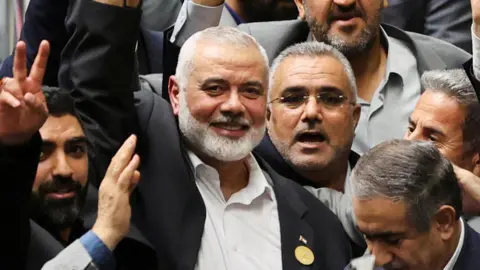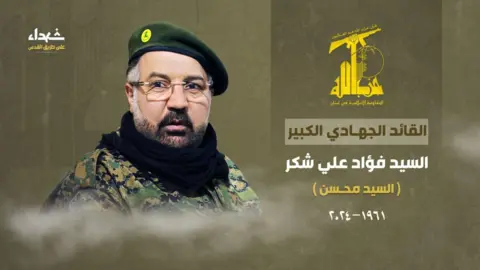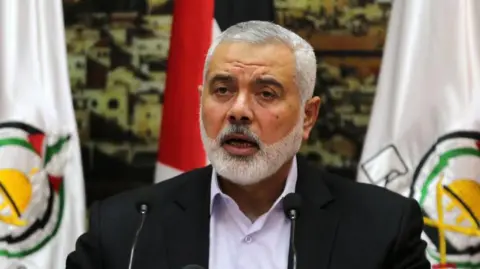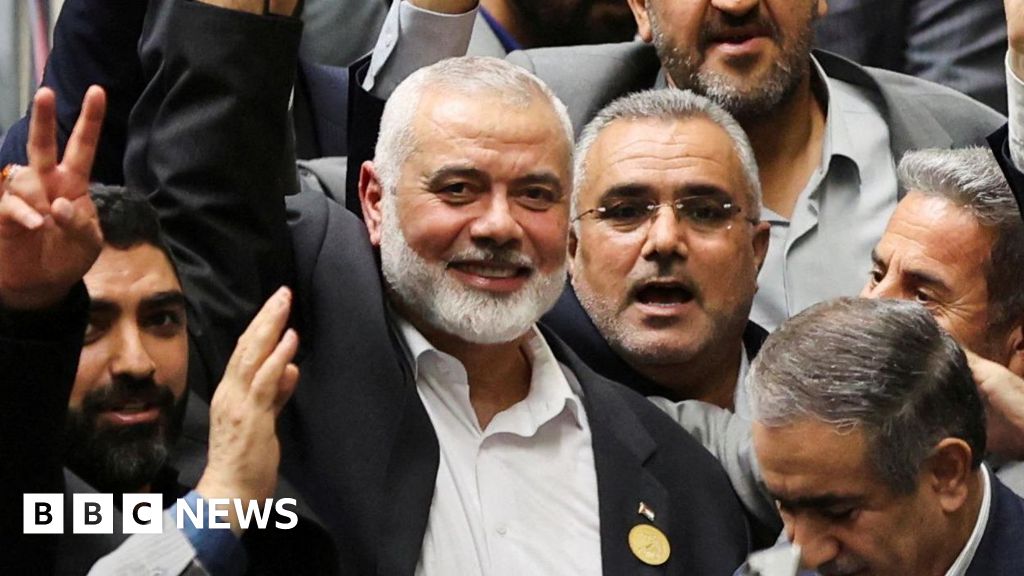 West Asia News Agency via Reuters
West Asia News Agency via ReutersIsrael has inflicted two devastating blows on its enemies.
It has not confirmed that it killed the Hamas political leader Ismail Haniyeh in Tehran, but it is hard to see who else would have wanted him dead more than the Israelis. As for the Hezbollah commander Fuad Shukr, Israel says he was killed in Beirut in an “intelligence-based elimination”.
For Israel, everyone senior in Hamas is a legitimate target after the attacks of 7 October 2023, which inflicted the worst single day of bloodshed on Israel since independence in 1948.
Fuad Shukr, Israel says, was killed because as a veteran Hezbollah commander he was responsible for the rocket attack that killed 12 children and young people in the Israeli-occupied Golan Heights.
Hezbollah has confirmed he was killed in the raid on Beirut. It denies carrying out the attack in the Golan.
Once again, the Middle East is full of speculation that the all-out war feared since 7 October is imminent. The deadly irony is no side wants that war, but increasingly they are prepared to risk it.
The Israelis have been under pressure from their American allies to calibrate their response to Hezbollah, inflicting a blow that will hurt the group without provoking a devastating retaliation and igniting a wider and deeper war.
But two assassinations amount to a major gamble.
Israel, under pressure from its allies in Washington, wanted to inflict a blow on Hezbollah that would not extract a devastating retaliation. The leader of Hezbollah, Hassan Nasrallah, might still decide that an attack on their stronghold in southern Beirut warrants a matching attack on Tel Aviv.
Israel might also have calculated that Iran would not go to war over an assassinated Palestinian leader, even though his death in their capital, under their protection, is a humiliation.
Killing Haniyeh, just after he had met the new Iranian president, is a dramatic display of Israel’s reach.
 Hezbollah
HezbollahThe Islamic Republic thought it re-established deterrence when it fired hundreds of missiles and drones at Israel in April – that claim has now been exposed as hollow. April’s barrage was also retaliation, for the Israeli air strike that killed two Iranian generals in Iran’s embassy in Damascus.
More retaliation looks certain from Iran, its ally Hezbollah or one of its proxies. Pro-Iranian militias in Iraq have made it clear that they blame the US equally for what has happened. In the Red Sea, the Houthis might redouble their attacks out of Yemen.
There are limits to what Hamas can do, after months of the Israeli onslaught in Gaza. But the Israelis are on high alert for attacks in the occupied West Bank or inside Israel itself.
It is important to realise that the Middle East is already in a regional war, but also to recognise that it could get much worse.
Even so, this round of killing and retaliation might not be the spark that ignites all-out war, though it is easy to construct scenarios based on the clear and dangerous risks and realities in the world’s most turbulent region.
Pulling back from the brink, repeatedly, is not making war any less likely. It makes it harder to construct a diplomatic pathway away from the looming threat of all-out conflict.
The only credible first step for lowering the deadly temperature in the Middle East is a ceasefire in Gaza.
 NurPhoto via Getty Images
NurPhoto via Getty ImagesIn recent weeks the Americans have said that it was getting closer. That was always hard to imagine while the two sides’ definitions of an acceptable ceasefire were so far apart. For Hamas, a ceasefire meant an Israeli withdrawal and the end of hostilities. For Israel, it meant a pause that allowed for the release of some or all of the surviving hostages, and the right to resume the war afterwards.
Now a ceasefire in Gaza looks as far away as ever, although the US Secretary of State Antony Blinken has said again that it remains America’s diplomatic priority.
Ismail Haniyeh was a leading figure on the Hamas side in the ceasefire talks. With his colleagues, he communicated with the US and Israel via the head of the Egyptian secret service and the prime minister of Qatar, Sheikh Mohamed bin Jassim al Thani.
The prime minister posted his response to the assassination of Haniyeh on X, writing: “Political assassinations and continued targeting of civilians in Gaza while talks continue leads us to ask how mediation can succeed when one party assassinates the negotiator on the other side.”
The assassination fits more closely into Israeli Prime Minister Benjamin Netanyahu’s conception of “total victory” over Hamas than into the American idea that a ceasefire is vital to avoid an even deeper regional catastrophe.
It will also strengthen the belief held by Mr Netanyahu’s critics inside and outside Israel that he wants to prolong the war, to avoid the moment when he faces a reckoning of the mistakes he made that allowed Hamas the space to attack with such devastating consequences on 7 October.
The Americans and French have also worked hard to find a diplomatic way to stop the border war between Israel and Hezbollah. But the vital first step would be a ceasefire in Gaza, and the prospect one was close has taken another hammer blow.


